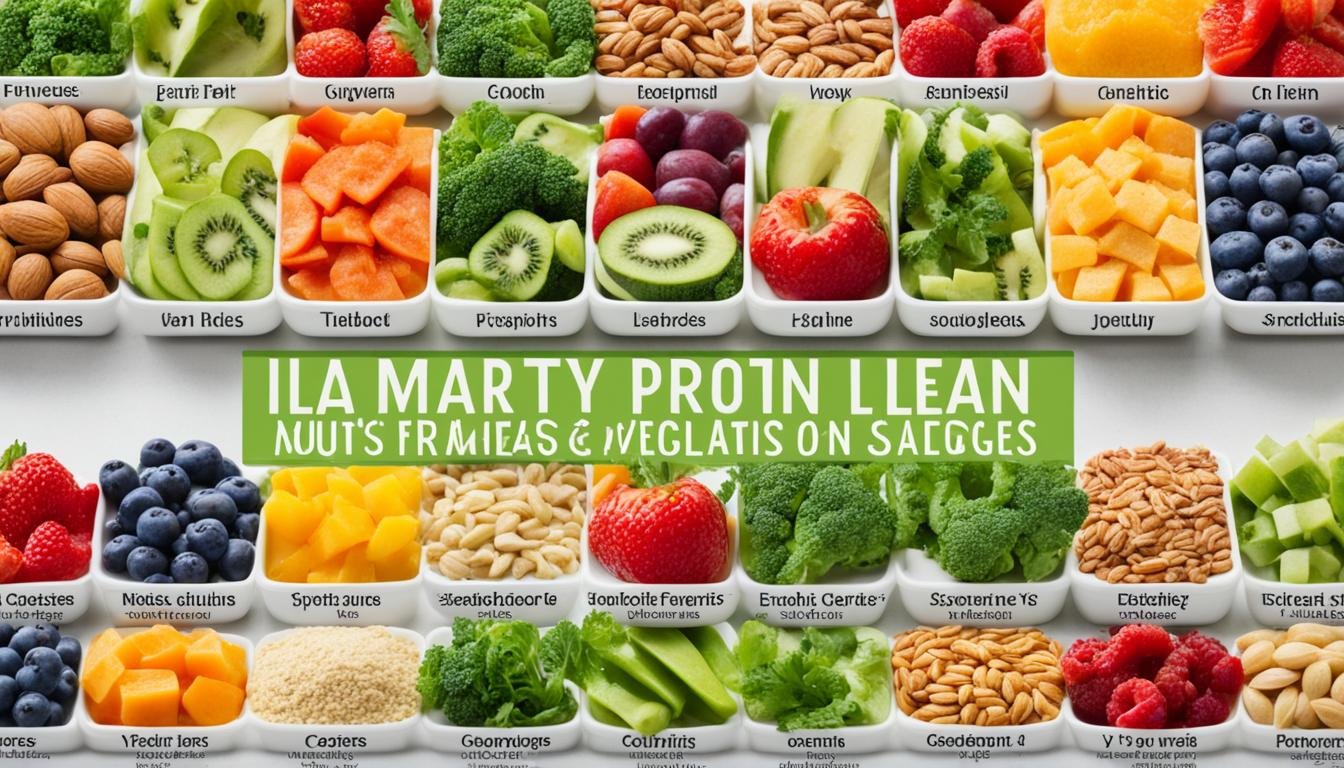Proper nutrition is key for keeping off weight in the long run. It’s more than just watching the number of calories. You have to feed your body well to meet your weight loss goals. Start by eating healthily, cutting down on calories, controlling your portions, and planning your meals. These steps will help energize your weight loss effort and prepare you for victory.
Begin with eating right to shed pounds for good. Focus on foods rich in nutrients. These include fruits, veggies, whole grains, lean meats, and good fats. Eating a variety of these foods will give your body everything it needs without too many calories.
To slim down, you gotta eat less than you use up. This means cutting back on portion sizes, picking low-cal options, and skipping high-cal treats and drinks.
Planning your meals is a secret weapon for weight loss. When you prep your food ahead of time, you can make sure it’s nutritious. This helps you stay away from last-minute unhealthy meals. Plus, it ensures you get the right mix of protein, carbs, and fats.
Eating foods that boost your metabolism can also help. Things like green tea, chili peppers, and ginger can rev up your body’s fat-burning power. Using these ingredients in your meals and snacks is like giving your weight loss a helpful push.
Mindful eating and shifting in your daily choices are vital for lasting weight loss. Listening to when you’re truly hungry or full helps you avoid overeating. It also helps you have a healthier relationship with food. Don’t forget to slot in regular workouts, get plenty of sleep, and find ways to chill out. These are all key to shedding extra weight.
Key Takeaways:
- Incorporate nutrient-dense foods like fruits, vegetables, whole grains, lean proteins, and healthy fats into your diet.
- Create a calorie deficit by reducing portion sizes, choosing lower-calorie options, and avoiding sugary drinks and processed snacks.
- Plan your meals in advance to have more control over what you eat and ensure a balanced mix of nutrients.
- Add metabolism boosters like green tea, chili peppers, and ginger to support your weight loss efforts.
- Practice mindful eating, embrace lifestyle changes, and include regular exercise to achieve long-term success.
The Power of Protein
Protein is a key part of losing weight. It helps you burn calories faster and controls how hungry you feel. This makes it easier to lose weight and keep it off.
Eating foods high in protein keeps you full longer. It reduces your desire for snacks and makes it simpler to follow your diet. This way, you might eat less without feeling hungry.
Metabolism Boost and Calorie-Burning
Protein speeds up your metabolism. If you eat it, your body uses more energy to process it. This helps burn more calories and lose weight.
Also, meals with a lot of protein make your body spend more energy. They do this more than meals with lots of carbs or fats. Eating more protein can help you lose weight more easily and keep it off.
Appetite Control and Fullness
Protein helps you feel full and satisfied. It makes you less likely to eat too much. This can stop you from grabbing unhealthy snacks.
“Adding protein to each meal can help control your appetite throughout the day, making it easier to stick to your weight loss goals.”
A study shows a high-protein breakfast can make you feel less hungry. People who ate such a breakfast felt full longer, eating less over the day.
A Simple, High-Protein Breakfast Idea
To start well, have a protein-packed breakfast. A tasty choice is a scramble with eggs, spinach, and sausage. This can be chicken or turkey but make sure it’s lean.
This meal boosts your metabolism and keeps you full. Eating this way sets you up for better choices the rest of the day. It makes it easier to lose weight and stay healthy.
| Benefits of Protein | How to Incorporate Protein |
|---|---|
|
|
Embrace Whole, Single-Ingredient Foods
Eating whole foods is a top way to lose weight and be healthy. These foods are not greatly changed from their natural state. This makes them rich in good things for your body. Adding these foods to your meals can help a lot with losing weight.
Natural Elimination of Added Sugar and Processed Ingredients
Whole, single foods don’t have hidden sugars or bad fats. Many foods that are processed have these. They can make it harder to lose weight. By picking whole foods, you keep these harmful things out of your meals. This helps you be more successful in losing weight.
Nutrient Density for Optimal Nourishment
Whole foods are full of the nutrients your body needs. They offer vitamins, minerals, fiber, and antioxidants. This helps keep you healthy. Giving your body these foods helps it work well. It also supports having a good weight.
Fueling Your Body with Filling Options
Whole foods help you feel full because of their fiber and water. This makes it easier to stop eating too much or snacking a lot. By eating whole foods, you can control your portions. This is good for losing weight.

The Versatility of Whole, Single-Ingredient Foods
There are so many ways to enjoy whole foods. You can mix vegetables, proteins, and grains in lots of tasty meals. Cooking with these foods is easy too. You don’t have to be a chef to make good dishes. Whether you’re experienced or new in the kitchen, there’s a meal for you.
Eating whole, single foods is great for your health and weight. It gets rid of bad sugars and processed foods. It focuses on giving your body what it needs. Picking these foods helps you on your journey to lose weight. Every step you take with whole foods helps a lot with your health.
Mindful Eating and Portion Control
Mindful eating and watching your portions are key for losing weight. By focusing on what and how much you eat, you cut down on calories. This makes you pick healthier options. Let’s see how these steps can help in your weight loss efforts.
Be Mindful of What You Eat
Mindful eating means paying attention to what’s in front of you and enjoying every bite. It lets you tune into your body’s signals saying if it’s hungry or full. This can stop you from eating too much. Eating slowly helps you notice when you’re full, not stuffed.
Forget about screens or eating in a hurry. Take your time to really taste and feel your food. Fully focusing on your meal makes you less likely to snack without thinking. It helps you make better choices overall.
Practice Portion Control
Portion control is just as important. It means being careful with how much food you eat. Even healthy foods should be eaten in the right amounts to help with weight loss.
One good tip is to use smaller plates. It makes your food look like more. Also, measuring your food or going by visual cues can guide you on the proper amounts.
Remember, balance is key. You can still enjoy your favorite foods if you keep an eye on portions.
Reduce Calorie Intake and Limit Added Sugar
Cutting down on calories is a must for losing weight. Mindful eating and being aware of portions naturally do this for you. This leads to a calorie deficit and helps in losing weight.
It’s also key to reduce added sugars. These are in many processed foods and drinks. They add lots of calories with little nutrition. Lowering your sugar intake boosts your weight loss and health efforts.
Hydrate with Water and Limit Liquid Calories
Keeping hydrated is essential for staying healthy and managing weight. Water can make you feel full and stop you from eating too much. Drink at least 8 glasses of water a day.
Avoiding high-calorie drinks is also important. Sodas, juices, and alcohol can add many calories without good nutrients. Choosing water over these drinks helps your weight loss journey a lot.

Summary
Mindful eating and controlling portions help a lot in losing weight. Paying attention to food choices, keeping food portions in check, lowering calorie intake, reducing sugars, and picking water over high-calorie drinks support a successful weight loss plan. Make these steps a part of your everyday life and see your journey to a healthier weight take off.
Plan Your Meals for Success
Planning meals is key for keeping off weight you’ve lost. It helps you choose nutritious foods that match your weight goals beforehand.
It’s wise to mix up what you eat. Put lots of fruits, veggies, whole grains, lean meats, and good fats on your plate. These meals will give your body the stuff it needs to work well.
Try to steer clear of processed foods. They often pack a lot of sugar, bad fats, and salt that can set back your shedding weight journey. Aim for foods that are more natural, with just one or a few ingredients.
Keep your kitchen stocked with snacks that are good for you. Enjoying things like nuts, seeds, yogurt, or fresh fruit can help you fight the munchies and stay full between meals.
Think about making lots of food at once. Cook big batches of healthy dishes and put them in single servings for the week. This can save time and ensure you always have something healthy ready, even on hectic days.
Don’t forget to drink a lot of water every day. It can lessen your desire to eat too much. And listen to your body: eat slowly, enjoy every bite, and stop when you feel satisfied.
When you plan meals and snacks in advance, you’re making a commitment to your weight journey. Stick to foods that are full of nutrients, cut down on the processed stuff, and make sure your eating is balanced. Planning like this helps you keep up good eating habits and meet your goals.
| Meal Planning Tips | Benefits |
|---|---|
| Stock up on nutritious foods and snacks | Prevents unhealthy food choices |
| Limit processed foods | Avoid added sugars and unhealthy fats |
| Include nutrient-dense options | Provides essential nutrients |
| Batch cook and meal prep | Saves time and ensures availability of healthy options |
| Stay hydrated and drink water | Curbs appetite and supports overall health |
| Eat mindfully and listen to your body | Prevents overeating and promotes satisfaction |
Conclusion
To keep off weight and stay healthy, focus on what you eat. Use the tips discussed earlier. Eat more protein, choose whole foods, eat mindfully, and watch your portions.
Include meal planning and pick foods that are rich in nutrients. By following these steps, you can reach your goals and lead a healthy life. But, you must also exercise and make healthy lifestyle changes. Being consistent and dedicated is key to keeping the weight off.
Food is more than what’s on your plate. It’s about what your body needs to be well. Focus on these nutrition tips to live better and lighter. A balanced life is the real secret to keeping fit and healthy.
FAQ
How can nutrition help with weight loss?
Why is protein important for weight loss?
What are whole, single-ingredient foods?
How does mindful eating and portion control contribute to weight loss?
Why is meal planning important for weight loss?
What is the key to sustainable weight loss?
Source Links
- https://www.healthline.com/nutrition/30-ways-to-lose-weight-naturally
- https://www.forbes.com/health/nutrition/foods-to-eat-to-lose-weight/
- https://www.healthline.com/nutrition/27-health-and-nutrition-tips








GIPHY App Key not set. Please check settings